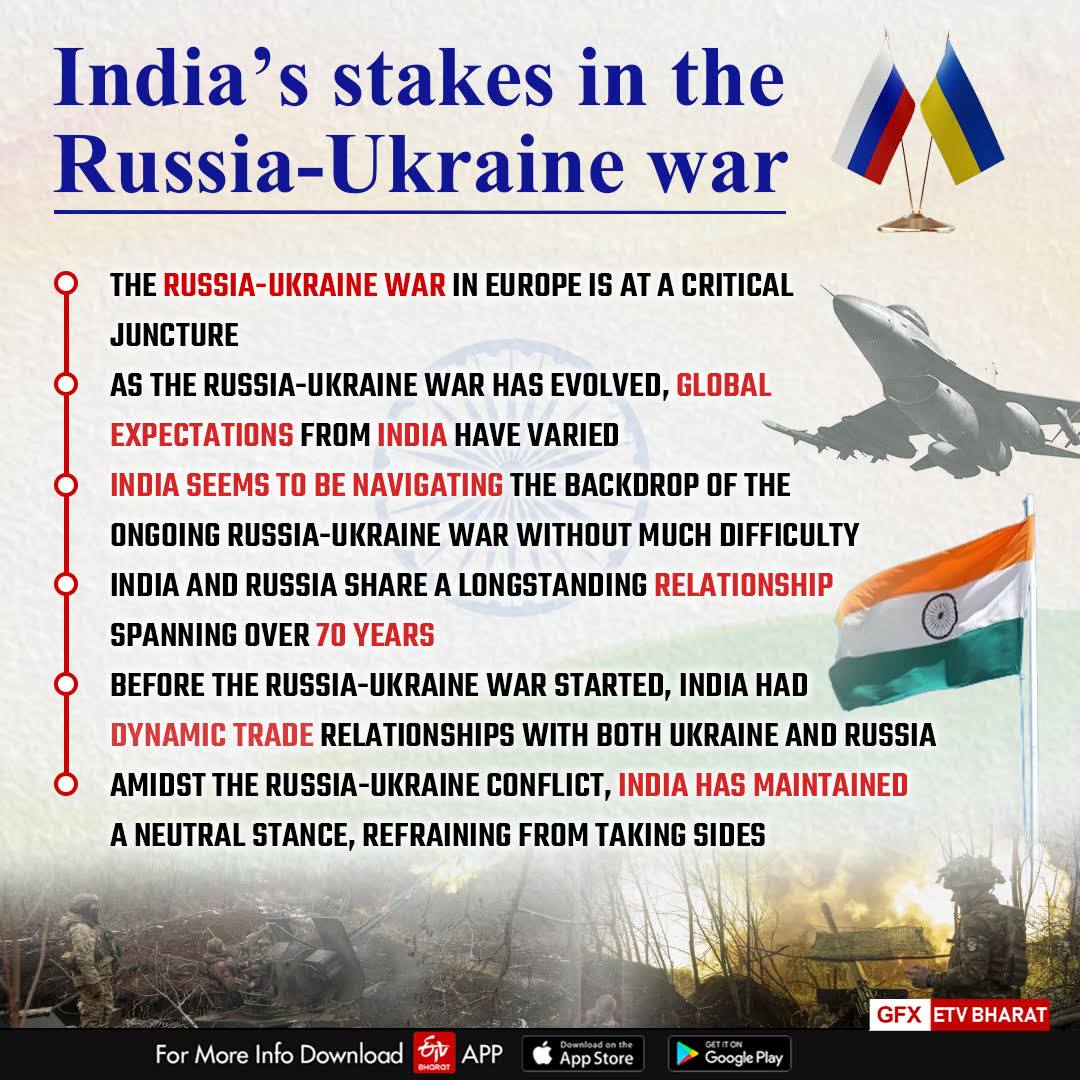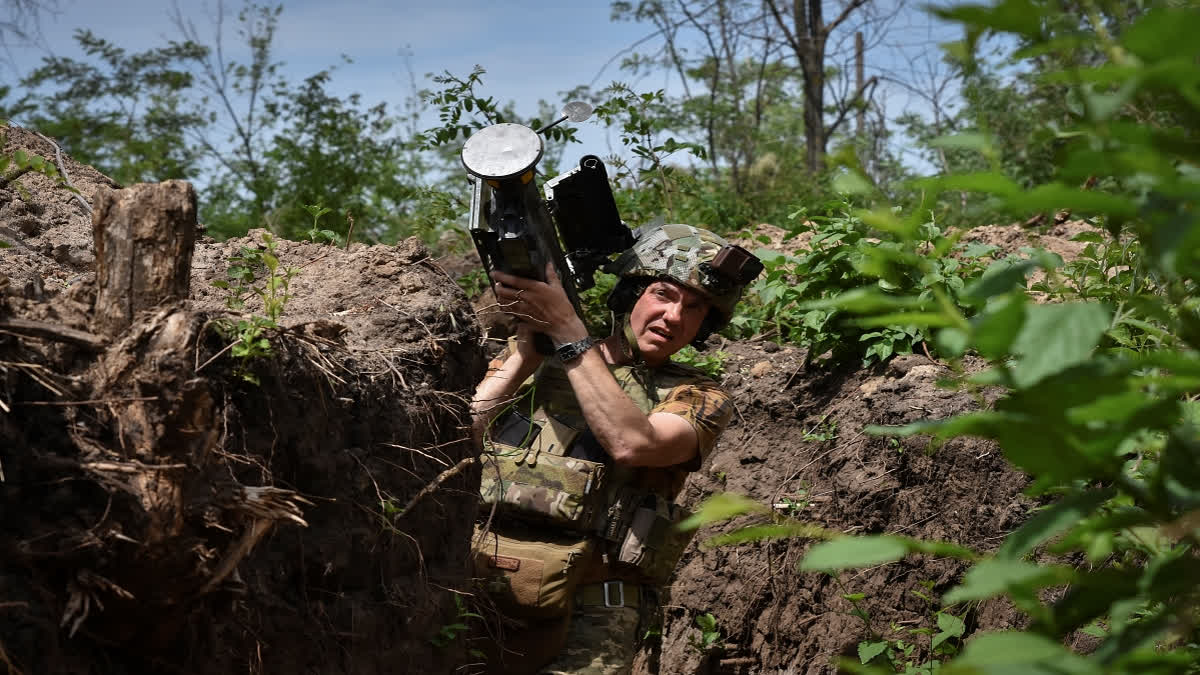The Russia-Ukraine war in Europe, despite the apparent lull from a distant Asia, is at a critical juncture. Russia is inching towards the most prominent city in Ukraine, Kharkiv, albeit with minimal gains.
The strategic developments on the battle field are gradual yet it could reposition Russia in Ukraine's east with new border demarcations. On the other hand, western arms supply to Ukraine may receive a fillip with the US aid of over $60 billion cleared by the US Congress in April. However, with no endgame in sight, global stakeholders are wary of basing their interests firmly on the evolving metrics of the war in Europe.
As the Russia-Ukraine war has evolved, global expectations from India have varied, ranging from seeing India as a potential mediator to viewing it as a party with stakes in both Ukraine and Russia. As the war has prolonged, these expectations have resurfaced, most prominently regarding India's participation in the upcoming Ukraine peace summit to be held in Switzerland on June 15-16 and the role it could play.
India seems to be navigating the backdrop of the ongoing Russia-Ukraine war without much difficulty, but what are the latent challenges for India, and where does a European war— geographically very distant — fit into India’s strategic calculus?
India and Russia share a longstanding relationship spanning over 70 years. From defence imports to strategic partnerships, the ties between these two nations run deep. India's reliance on Russia for defence equipment and maintenance is significant, but are these factors sufficient to solidify positions on issues with global implications?
Reducing the nuances of this relationship to defence or history alone would be simplistic. First, the bilateral relationship itself has evolved considerably since the Cold War era. Second, India’s strategic and economic status has changed significantly, altering its bilateral and multilateral influence.

Strategic autonomy
Before the Russia-Ukraine war started, India had dynamic trade relationships with both Ukraine and Russia. The ongoing war has disrupted supplies from both countries, impacting India’s energy and food security. Like most countries, India has had to adapt and recalibrate.
India's stand is against any form of war in this age. However, its position has been described as supporting its own interests rather than favouring one party over another. India’s objective assessment of its interests in the ongoing Russia-Ukraine war can be based on three planks: its strategic autonomy, the great power restructuring of the global order underway, and its energy and defence needs.
Amidst the Russia-Ukraine conflict, India has maintained a neutral stance, refraining from taking sides. This approach is rooted in several key factors. Firstly, India's historical perspective emphasises the absence of direct stakes in European continental disputes. Just as India would not appreciate external intervention in Asian conflicts, it refrains from interfering in European affairs. The primary context of the ongoing war between Russia and Ukraine is European continental history, where India's stakes are absent.
India's decision to maintain strategic autonomy in the Russia-Ukraine war is prudent for several reasons. Firstly, taking sides risks entangling India in a conflict with far-reaching consequences. Given the complex web of alliances and interests involved, neutrality safeguards India's national interests and diplomatic flexibility.
Restructuring of the global order
The nature of the conflict between Russia and Ukraine, indeed a great power struggle, raises concerns about the division of the world into opposing blocs. With Russia on one side and Ukraine backed by the West on the other, the outcome appears prolonged and fraught, leading to a fractured world order.
India's interests lie in circumventing the shifting geopolitical currents. The evolving global order underscores the need for multi-alignment rather than alignment with any single power bloc. By steering clear of partisan positions, India must navigate the geopolitical landscape while safeguarding its economic and strategic interests.
Geo-politically, the Russia-Ukraine war is a great power conflict that structurally threatens to divide the world into heavily polarised halves and various multi-aligned clusters. Given the alignment of Russia and Ukraine, backed by the West on opposite sides with little indication of compromise, the outcome of the Russia-Ukraine war seems inevitable — it will hasten the fracture in the world order. The signs of this fracture are already visible, with Russia, China, Iran, Syria, North Korea, and some other states on one side, and the West on the other. There is, of course, enough space for states that have remained neutral in this conflict. Taking a position without significant stakes always complicates the values versus interests equation in international relations.
The world order is truly in a transitional phase from multi-polarity to multi-alignment, and the Russia-Ukraine war, as well as the Hamas-Israel conflict, seeks to disrupt this natural transition. These disruptions have pushed multi-alignment backward while simultaneously reinforcing multipolarity, where power concentration is likely to be asymmetrically higher than power dispersal.
However, the resultant multipolarity will be strewn with multi-aligned interests. In other words, countries may be aligned with one side politically while maintaining economic relations with the other. China perhaps represents the best form of this duality with its strong ties with Russia and a relatively stable economic relationship with the West.
India’s energy and defence needs
With Russia being one of India's largest defence suppliers, the relationship holds immense strategic importance. Since February 2022, India's oil dependence on Russia adds another layer of complexity, not just due to supply chain issues but also price variables. Despite being an energy-reliant nation, India's oil imports from Russia underscore its reliance on the global energy market. The stability of oil prices is a key factor for a large energy-dependent country like India.
There are competing predictions regarding the Russia-Ukraine war, which should not muddle India's choices. Externalities, such as the likely outcome of the war, should not influence India's position. Finally, what would preserving India's own interests vis-à-vis the Russia-Ukraine war mean for India's other great power relations?
For its relations with the US, it could mean circumventing more sanctions and additional end-use monitoring compulsions to ensure India's own interoperability with the US. Secondly, the China factor in the India-Russia relationship is likely to evolve regardless of the China-Russia relationship, unless dramatic changes rupture China's own relationship with the West.
(The writer is Fellow, Strategic Studies Program, Observer Research Foundation)



